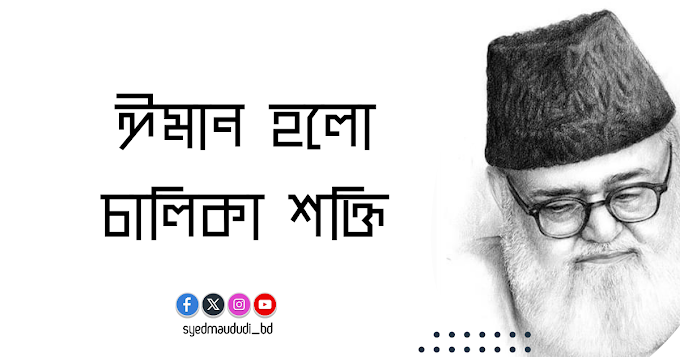The political system of Islam has been based on three principles, viz: Tawheed (Unity of God), Risalat (Prophethood) and Khilafat (Caliphate). It is difficult to appreciate the different aspects of the Islamic polity without fully understanding these three principles. I will therefore begin with a brief exposition of them.
Tawheed (Unity) means that one God alone is the Creator, Sustainer and Master of this universe and of all that exists in it-organic or inorganic. The sovereignty of this kingdom vests only in Him. He alone has the right to command or forbid. Worship and obedience are due to Him alone, none else sharing it in any degree or form. Life, in all its multifarious forms, our physical organs and faculties, the apparent control which we have over everything that exists in this universe, and the things themselves- none of them has been created or acquired by us in our own right.
They are the bountiful provisions of God and in bestowing them upon us no one is associated with Him. Hence, it is neither for us to decide the aim and purpose of our existence or to prescribe the limits in our worldly authority nor is anyone else entitled to make these decisions for us. This right vests only in God, Who has created us, endowed us with mental and physical faculties, and provided all material provisions for our use. This principle of the Unity of God altogether negates the concept of the legal and political sovereignty of human beings, individually or collectively. Nothing can claim sovereignty be it a human being, a family, a class or group of people, or even the human race in the world as a whole. God alone is the Sovereign and His commandments are the Law of Islam.
The medium through which we receive the Law of God is known as 'Risalat' (Prophethood). We have received two things from this source: (a) The Book in which God has expounded His Law; and (b) the authoritative interpretation and exemplification of the Book of God by the Prophet, through his word and deed, in his capacity as the representative of God. The broad principles on which the system of human life should be based have been stated in the Book of God. Further, the Prophet of God has, in accordance with the intention of the Divine Book, set up for us a model of the system of life in Islam by practically implementing the law and providing necessary details where required. The combination of these two elements, according to Islamic terminology, is called the 'Shari'at'.
Let us now consider Khilafat, which according to the Arabic lexicon, means 'representation'. The real position and place of man, according to Islam, is that of the representative of God on this earth, His vicegerent; that is to say, by virtue of the powers delegated to him by God, he is required to exercise the Divine authority in this world within the limits prescribed by God.
Now take, for example, the case of an estate of yours on which someone else has been appointed to administer on your behalf. You will see that four conditions are invariably fulfilled in this case. First, the real ownership of the estate remains vested in you and not in the administrator; secondly, he would administer your property only in accordance with your instructions; thirdly, he would exercise his authority within the limits prescribed by you for him; and fourthly, in the administration of the trust he should execute your will and fulfil your intentions and not his own.
These four conditions are so inherent in the very concept of 'representation' that they must come to mind as soon as one utters the word 'representation'. If any representative does not fulfil these four conditions he will naturally be blamed for violating the limits of his representative capacity and for breaking the covenant which was implied in the concept of 'representation'.
This is exactly what Islam means when it lays down that man is the caliph of God on the earth. Hence, these four conditions are also involved in the concept of 'Khilafat. The state that is established in accordance with this political theory will in fact be a human caliphate under the sovereignty of God and will have to fulfil the purpose and intent of God by working on God's earth within the limits prescribed by Him and in conformity with His instructions and injunctions.
Source : Islamic Way of Life






